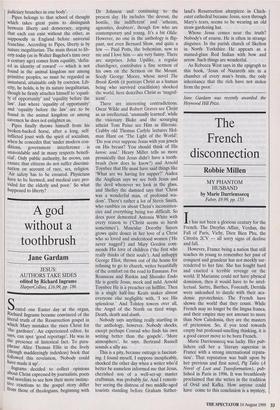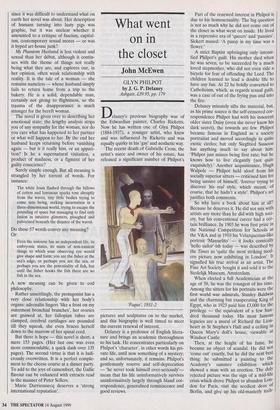The French disconnection
Robbie Millen
MY PHANTOM HUSBAND by Marie Darrieussecq Faber, £9.99, pp. 153 It has not been a glorious century for the French. The Dreyfus Affair, Verdun, the Fall of Paris, Vichy, Dien Bien Phu, the Citroen 2CV — all sorry signs of decline and fall.
However, France being a nation that still teaches its young to remember her past of conquest and grandeur has not meekly sur- rendered to her fate. She has fought hard and exacted a terrible revenge on the world. If Marianne could not have physical dominion, then it would have to be intel- lectual. Sartre, Barthes, Foucault, Derrida were unleashed to dazzle with their aca- demic pyrotechnics. The French have shown the world that they count. While French may no longer be the lingua franca, and their empire may not amount to more than New Caledonia, they are the masters of pretension. So, if you tend towards. empty but profound-smelling thinking, it is a good career move to be born French.
Marie Darrieussecq was lucky. Her pub- lishers call her a 'literary superstar in France with a strong international reputa- tion'. That reputation was built upon by her previous and first novel, Pig Tales (A Novel of Lust and Transformation), pub- lished in Paris in 1996. It was breathlessly proclaimed that she writes in the tradition of Ovid and Kafka. How anyone could have come to this conclusion is a mystery, since it was difficult to understand what on earth her novel was about. Her description of humans turning into lusty pigs was graphic, but it was unclear whether it amounted to a critique of fascism, capital- ism, contemporary sexual mores — or was it hyped art-house junk?
My Phantom Husband is less violent and sexual than her debut, although it contin- ues with the theme of things not really being what they are, and explores our, in her opinion, often weak relationship with reality. It is the tale of a woman — she remains nameless — whose husband simply fails to return home from a trip to the bakery. He is a solid, dependable man, certainly not giving to flightiness, so the trauma of the disappearance is much stronger for the bereft woman.
The novel is given over to describing her emotional state; the lengthy analysis strips you of any sympathy for the woman, nor do you care what has happened to her partner or what will happen to her. By the end her husband keeps returning before vanishing again — but is it really him, or an appari- tion? Is he a supernatural visitation, a product of madness, or a figment of her guilty conscience?
Surely simple enough. But all meaning is strangled by her torrent of words. For instance:
The white foam flashed through the billows of cotton and luminous sparks rose abruptly from the waves, tiny little bodies trying to come into being, seeking incarnation in a three-dimensional world, trying to escape the pounding of space but managing to find only fusion in intuitive glimmers, ploughed and pulverised beneath the disaster of the waves.
Do these 57 words convey any meaning? Or:
Even the universe has an independent life, its embryonic states, its mists of non-existent things to which your observing eye would give shape and form; you are the fisher at the sea's edge, or perhaps you are the sea, or perhaps you are the potentiality of fish, but until the fisher hooks the fish there are no fish in the sea.
A new meaning can be given to cod philosophy.
Rather unsettlingly, the protagonist has a very close relationship with her body's organs: adrenalin lingers 'like a frost on my outermost bronchial branches', her ovaries are gnawed at, her fallopian tubes are clamped, cerebral cartilages are pounded till they squeak, she even braces herself down to the marrow of her spinal cord.
But there is hope — this novel is short, a mere 153 pages. (Her last one was even more commendable, a quick dash over 135 pages). The second virtue is that it is ludi- crously overwritten. It is a perfect comple- ment to the cheese course at a dinner party. To add to the joys of camembert, the Gallic flavour can be enhanced with extracts read in the manner of Peter Sellers.
Marie Darrieussecq deserves a 'strong international reputation'.



























































 Previous page
Previous page